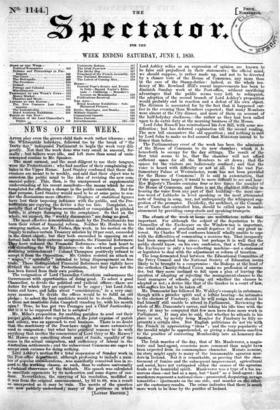The efenfa of the week at home are multifarious rather
thin important. For although the subject of the deputation to the Chancellor of the Exchequer on the Window-tax is important, the total absence of practical result deprives it of any great in- terest. Sir. Charles Wood confesses himself wholly unable to cope with the difficulties of commuting a noxious tax. That incapacity had been suspected long since ; but perhaps it is well that the public should know, on his own confession, that a Chancellor of the Exchequer' is only a tax-collecting machine—not a statesman or legislator to deal with the adjustment or reform of taxation. The long-fermented feud between the Educational Committee of the Privy Council and the National Society of Education seems likely to be brought to a compromise : the Bishops at the head of the orthodox Charity-School Union make no profession of surren, der, but they seem inclined to fall upon a plan of leaving the question of adopting or rejecting the management-clauses to the local managers of schools, giving aid 'whether the clauses be adopted or not; a device like that of the Quaker in a court of law, whb•suffers his hat to be taken off.
Mr. Duneombe has followed Mr. Wakley's example in substance, though with a prouder spirit and a loftier bearing—he intimates to the electors of Finsbury, that he will resign his seat should he find himself still unable to attend in Parliament. Reviewing the whole of Mr. Duncombe's career, and taking his idle time with the' busy, it may be computed that few men have done more work in Parliament. It may also be said, that whether he attends in his place or not, by merely being Member for Finsbury he fitly re- presents a certain idea. But English politicians do not vie with the French in appreciating " ideas " ; and the very popularity of the invalid might be apprehended, as giving a dangerous sanction to the practice of converting Membership into an honorary dis- tinction.
The Irish murder of the day, that of Mr. Mauleverer, a magis- trate and land-agent, occasions more comment than might have been expected from its commonplace character. Mutato nomine, its story might apply to many of the innumerable agrarian mur- ders in Ireland. But it is remarkable, as proving that the chas- tisement of famine and the subsequent improvement, agricultural and social, have not -extirpated either the causes of the agrarian feuds or the homicidal spirit. Mauleverer was a type of a too nu- merous class—not bad as a man, but "hard" as a land-agent : his murderers represent a national dass—prosecuted, despairing, savage tenantries ejectments on the one side, - and murder on the other, are the customary results. The crime indicates that there is much more work to be done by the purifier of Ireland.


























